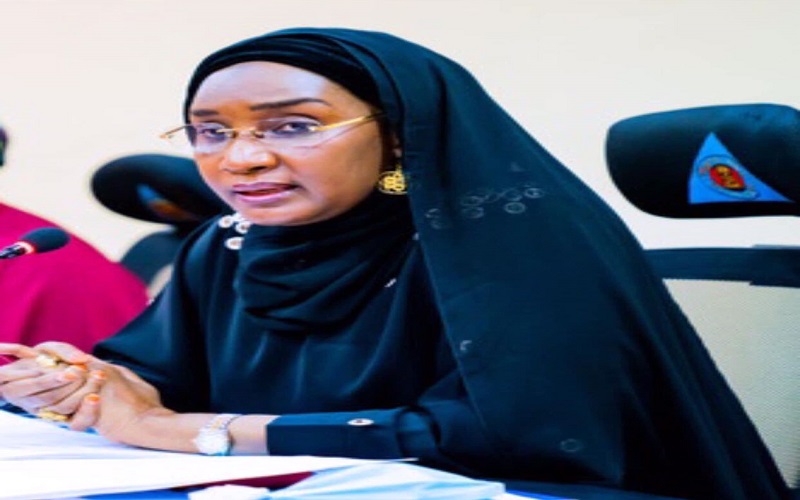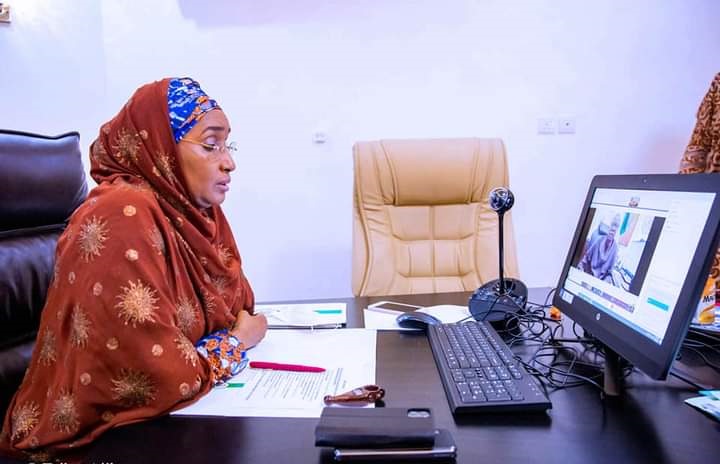In 2021, the Ministry of Humanitarian Affairs, Disaster Management and Social Development expanded and restructured the National Social Investment Programme, NSIPs, to accommodate more people, in a bid to meet the target of the present administration goal, of improving the livelihood of 100 million Nigerians.
Radio Nigeria highlights major activities that played out under the Ministry last year.
The idea behind the expansion of the National Social Investment Programmes, NSIPs and repositioning of some programmes under the scheme was in line with President Muhammadu Buhari’s directive that more citizens be accommodated to ensure fair social inclusion in the area of jobs, welfare and skills acquisition to meet the targets of lifting Nigerians out of poverty.
To this effect, the Ministry of Humanitarian Affairs, Disaster Management and Social Development swung into action by inaugurating the N-power Batch C Stream 1 after the expiration of Batch A and B.
Some beneficiaries of the scheme were trained on Hardware and software development and given starter packs while they receive stipends until the expiration of the programme.
Similarly, some youths across the country were trained as Mobile Money Agents and equally provided with start-up kits comprising a Point of Sale Machine, Fingerprints Scanner, Chairs, Tables and Umbrellas.
The Ministry of Humanitarian Affairs, Disaster Management and Social Development Hajiya Sadiya Umar-Farouq said the Federal Government remains determined to ensure that no one is left behind.
”Since the inception of President Buhari’s administration, in 2015 the government has paid more attention to protecting and promoting the plight of the poor and vulnerable persons in the country and this informed the decision to initiate the national social investment programme as a strategy for enhancing the social inclusion of the most vulnerable segments of our society.
”Since, its introduction in 2016 it has impacted positively on the lives of the poor and vulnerable persons in Nigeria.
In addition, the Government Enterprise and Empowerment Programme GEEP a micro-lending investment scheme under the National Social Investment Programmes was restructured to GEEP 2.O to reach more underprivileged Nigerians to access interest-free loans to start-up businesses.
Still, in the year under review, a Rapid Response Register tagged RRR for Covid19 cash transfer for the urban poor which targeted one million Nigerians was initiated through the National Social Nets Coordinating Office.
The vice president, Professor Yemi Osinbajo said the initiative was to improve the lives of urban dwellers affected by the pandemic, considering that past beneficiaries were rural dwellers.
“As of Dec. 31, 2020, we have identified and registered about 24.3 million poor and vulnerable individuals into the National Social Register; equivalent to about 5.7 million households.
“Through this project, we are currently injecting about N10billion directly into the hands of about two million poor and vulnerable households every month.”
“The initiative is about the largest evidence-based effort by any administration on poverty reduction and its impact on the lives of the poor is huge.
A Multi-Sectoral Committee for the Home-Grown School Feeding Programme to help achieve the objective of the scheme was launched and Utensils were distributed to beneficiaries of the Home-grown School Feeding Programme across the country.
A landmark achievement was recorded in the course of the year when President Muhammadu Buhari inaugurated the National Senior Citizen Center and declared the 5th of October as National Day to celebrate older persons in the country.
“The National Senior Citizens Centre was passed into law as the National Senior Citizens Centre Act, 2017 to cater for the needs of senior citizens (70 and above) in the country.
“To realize this noble objective, and in order to ensure relevance and spread, persons of proven integrity from key ministries and organizations have been appointed into its Governing Board.
Also, the Ministry met with relevant Agencies to Review the Draft National Multi-Sectoral Flood Emergency Preparedness and Response Plan.
The Technical Group which drafted the plan includes the Nigeria Hydrological Services Agency, the Nigerian Meteorological Agency and the National Emergency Management Agency.
Hope was raised for Internally Displaced persons as the Federal Executive Council approved the National Policy on Internal Displacement.
According to the Minister, the policy would strengthen institutional mechanism and frameworks for the realization of the rights, dignity and wellbeing of vulnerable populations through mitigation of the impact and achievement of durable solutions to Internal Displacement in Nigeria”.
In the year, an official brochure of ‘10 years Migration Partnership between Nigeria and Switzerland’ was launched as well as the ‘Blue Bus Project’ implemented by NAPTIP, NDLEA and IOM in celebration of ten years of Nigerian-Swiss Migration Partnership.
Looking forward, Stakeholders in the sector believe that if the Ministry strengthens its collaboration with relevant agencies it would address emerging humanitarian issues.
They also expressed optimism that when the National Policy on Internal Displacement is fully implemented it would give succour to internally Displaced Persons.
RN

